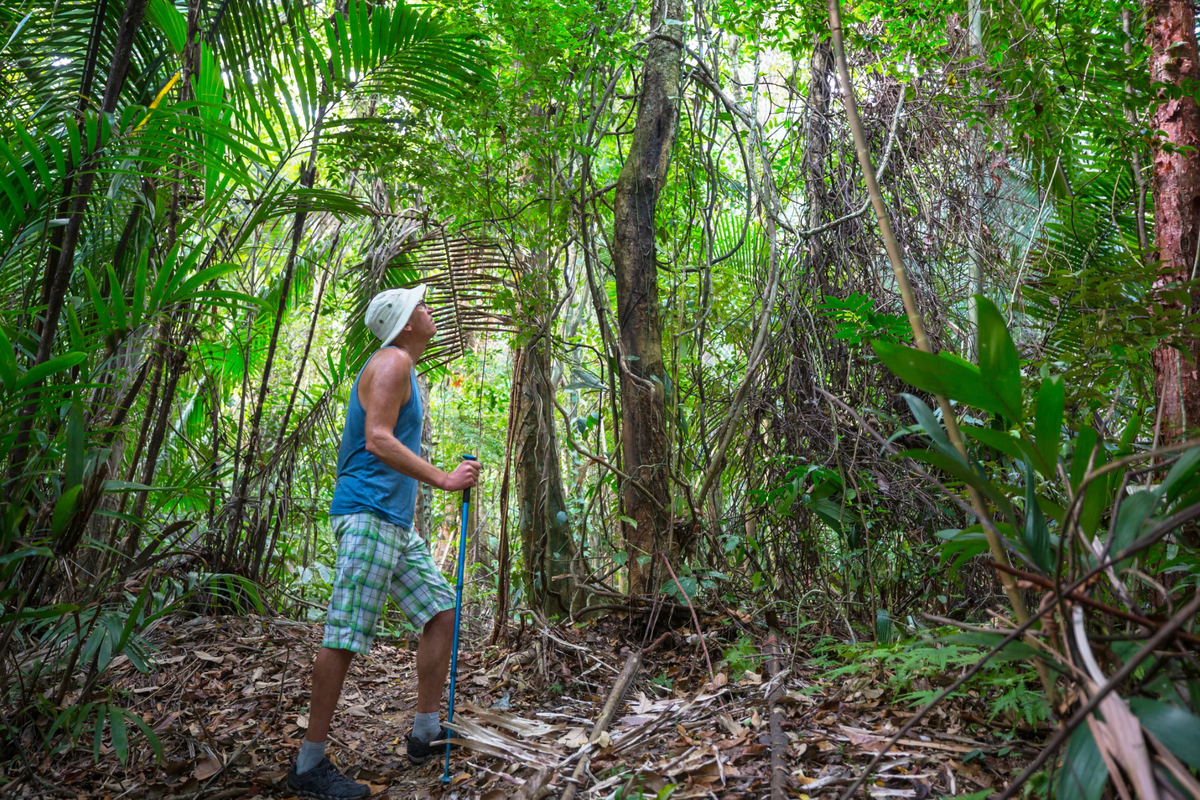22-year-old forgoes buying a home and spends his life savings on a chunk of raw Colombian jungle
People are floored that he was able to use his $40,000 in savings to create such a "dream life."
Man walks through the jungle
At 22, most people are just starting their careers or trying to save for their first apartment. Robert Lennox-Hvenekilde, a 22-year-old from Denmark, just spent his entire life savings. Not on a house, a car, or even a fancy degree, but on 7.5 acres of raw, undeveloped jungle in Colombia. His story is now sparking a viral conversation, showing a path that’s completely different from the one most are "supposed" to take.
The problem is that settling down and buying property has become ridiculously, ludicrously out of reach for a lot of young people. Price-to-income ratios are the highest they've ever been in the history of the United States, and many of the new generation of adults who have achieved the dream of owning their own home have found it to be... a trap! Yes, there are a lot of amazing benefits to being a homeowner, but it can also be a massive drain on your finances, your time, and your freedom.
One Gen Z man is doing things a little differently. Instead of investing in his first house, he spent his life savings on 7.5 acres of undeveloped jungle in Colombia.

Twenty-two year old Robert Lennox-Hvenekilde from Denmark has always been an adventurer, filming his outdoorsy-escapades on TikTok for years. But a recent trip to Colombia left the Gen Z-er inspired to take his interest in nature to the next level.
"[I] realized that there were a lot of people living in these areas of the world who were maybe not rich in an economic sense, but they just seemed extremely free and to have an extremely high quality of life," he told Newsweek.
He decided to do something a lot of people only dream or fantasize about: live in Colombia, among nature, and create a sustainable homestead for himself. After months of researching, networking, and negotiations, he was able to purchase three hectares (or 7.4 acres) of undeveloped land for about $40,000. That equates to roughly five or six football fields, for reference.

The jungle land Lennox-Hvenekilde now calls home features a fresh water stream, avocado and other fruit trees, and sugar cane.
He's currently building a small structure on the land to live in, and he plans to be a good caretaker of the land. Outside of harvesting fruit and avocado to eat and sell, he says he'll continue to plant and nurture native plant species to provide a habitat for the several species of endangered monkeys living there. Lennox-Hvenekilde also says his property came with special trees planted specifically for wood production, which he's using to create his dwelling.
"I would not cut down any of the native jungle," he says.
Watch him give an amazing tour of his new home here:
@roba_tron Property break down #4you #foru #danmark #wildlife #nature #dk #offgrid
Nearly two million people were fascinated by the wild video. Many were inspired by a way of life they'd previously thought completely unattainable.
"Dream life"
"can i come join you... sounds amazing"
"Bro made the best decision of his live"
It looks incredible on camera: the vibrant greens of the rainforest, working with your hands instead of staring at a computer all day, never having to commute or deal with rude strangers out in public. (Where do I sign up!?)
Still, others had mixed feelings:
"Please take care of the land and his water. Is our job to protect our nature. Plant trees and native flowers," one person implored.
More than a few commenters were uncomfortable with an outsider buying up endangered jungle land in a foreign country, likening it to gentrification.
Lennox-Hvenekilde's response has been that it's better for someone like him to take a small piece of the land for living, and harvest and care for the rest. Conversely, mass farmers burn down hundreds of thousands of acres of rainforest every single year in Colombia to make room for their crops. Compared to that, the 22-year-old's impact will be extremely minimal.
@roba_tron Project Property #4you #foru #wildlife #nature #offgrid #cabin #adventure #danmark #dk
We've all had the fantasy at one time or another. Disappear, leave our entire life and Earthly possessions behind, and flee deep into nature. Live off the land. Create a simpler life for ourselves. Be happy.
In fact, and perhaps unsurprisingly, interest in off-grid living has been steadily growing in popularity due to factors like rising costs, fierce political division, and an increasingly hectic and stressful modern lifestyle.
For most of us, though, the thought remains a fantasy. As appealing as it sounds, the idea of actually saying goodbye to our career, friends, family, and human pleasures is a little frightening. Even more so when we realize that living off the grid is a ridiculous amount of work. Sourcing our own food and fresh water? Having little to no access to medical care if we were to get injured or sick?
@roba_tron Day 36 #4you #foru #wildlife #nature #offgrid #cabin #danmark
It took a lot of bravery for Lennox-Hvenekilde to take such a big leap the way he did. And his journey is still not without its dangers. His viewers worry he might have run ins with the infamous Colombian drug cartels, which operate in the rainforest growing coca, which is used to make cocaine. And then there are all the bears, jaguars, and creepy crawlies.
"But how are the spiders?" one commenter asked Lennox-Hvenekilde. "Big," he said.
Yeah, on second thought, maybe that commute doesn't sound quite so bad. But kudos to him for showing us all what's possible.
This article originally appeared earlier this year.

